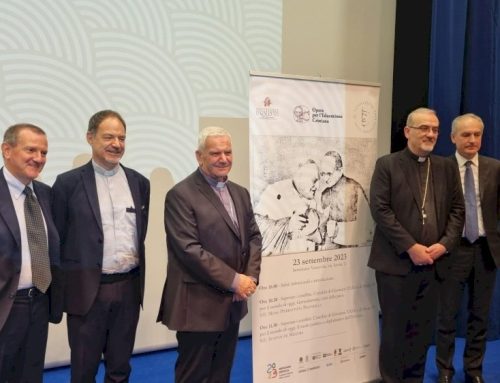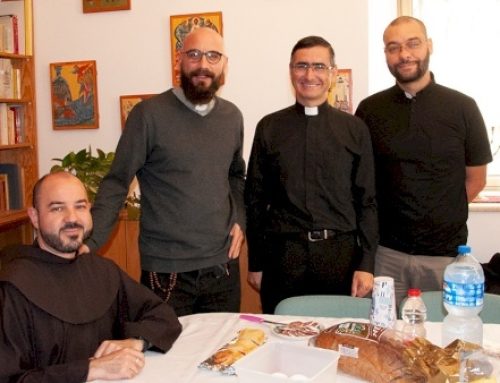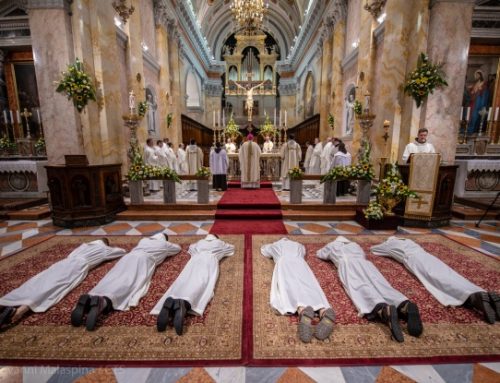Indigenous Christians in the Holy Land need hope and support, according to priest. By Robert Delany Of The Michigan Catholic.
CANTON TWP – For too many American Christians, a pilgrimage to the Holy Land only focuses on the “dead stones†of its sacred historical sites, according to Fr. Emil Salayta.
He wants them to also take an interest in the Holy Land’s “living stonesâ€â€”the dwindling remnant of its once-thriving Palestinian Christian community.
Many of the area’s Christians trace their families ‘ conversion to the first century- to those shepherds and others who heard the Good News from Christ or the Apostles.
Now, however, economic and social restrictions imposed by the Israeli government- coupled with the lure of a better life in the United States or other countries – threaten to destroy a community that has withstood first Roman persecution and them Muslin domination for nearly 2,000 years.
Over the past 50 years, Christians have gone from 18 percent to less than 2 percent of the population of the Holy Land.
“Most of our young Palestinians don’t see any hope. We will end up with a monument of Christianity, not a living Christian community,†said Fr. Salayta. He oversees the 43 schools of the Latin Patriarchate of Jerusalem, the Roman Catholic archdiocese for Jerusalem, Palestine, Israel and Jordan.
Fr. Salayta, who is also pastor of Immaculate Conception Parish in the Palestinian town of Bir Zeit, came to the United States last month in his newly added role as chair of the Holy Land Christian Ecumenical Foundation’s coordinating Committee in the Holy Land.
The HCEF hopes to establish ties between Christians in the Holy Land and those in other parts of the world.
Its aim is to provide spiritual and material assistance to Palestinian Christians to stem the trend toward emigration that threatens to empty the area of all indigenous Christians by early in the next century.
“We need to create signs of hope,†Fr. Salayta said.
HCEF President Rateb Y. Rabie, a Jordanian-born businessman who now lives in Silver Spring, Md., said the plight of Palestinian Christians has not received much attention in the American media.
Rabie added, however, that he is confident of how most Americans will respond when they understand the situation.
“The American people, when they find out the truth, they really come forward,†he said.
A major problem has been the difficulty of obtaining building permits in Israeli-controlled areas, according to Fr. Salayta.
“Housing is a great and urgent need, because most of our Christian young people are not about to start their families if they have no place to live,†he said.
With unemployment at 30 percent throughout the West Bank, job creation in Palestinian areas is another priority, if Christians are to remain in the Holy Land.
At present, Palestinians can only go into Jerusalem to work if their skills are considered essential, according to Fr. Salayta.
“(Palestinian) Christians are not allowed to enter Jerusalem with out special permission from the military, which is very difficult to get,†he said.
Even Palestinian craftsmen who make items out of olive wood for the tourist market are not allowed to take their goods into Jerusalem, Fr. Salayta continued.
One of the signs of hope in the area is the Living Stones Housing Project in BirZeit, which will provide housing for 46 Christian families, mostly newly young married couples. Besides helping ease the housing shortage, it is also providing some construction jobs to Palestinians while it is under construction.
The HCEF is also tackling the problem of finding a market for local handicrafts and needlework by sponsoring Holy Land gift fairs in the United States.
Fr. Salayta said he also believes that American Christians will respond to the HCEF’s appeal for help.
“Most of the American people are kind-hearted and generous, and once they get the chance to hear the truth, they will express their solidarity,†he said.
As eager as HCEF officials are to channel financial assistance to Palestinian Christians they emphasized that they are also looking for moral and spiritual support.
Palestinian Christians often feel forgotten and abandoned by the rest of the Christian world, according to Fr. Salayta.
Especially hurtful, he said, is the way many evangelical Christians in the United States give unquestioning support to Israel, despite what he called human rights abuses against indigenous Christians.
Fr. Salayta delivered that message to an evangelical audience when he spoke at William Tyndale College in Farmington Hills during his visit.
“I told them about the right-wing evangelicals, and how they hurt us in the Holy Land by supporting Israel publicly and by teaching that it is the fulfillment of the Bible,†he said.
That position is also bad theology, Fr. Salayta continued. “I told them the Israel of God is a spiritual concept, not a territorial one and that by blindly supporting the modern state of Israel they are supporting injustice. This was a new message for them,†he said.
Other projects of the HCEF include establishing Children’s English Reading Clubs in Palestinian schools, encouraging exchanges of correspondence between Palestinian and American schoolchildren, and developing parish partnership relationships between parishes in the Holy Land and ones in the United States.
For more information about any of the programs of the Holy Land Christian Ecumenical foundation, call (301) 871-9222 or access their Web site at https://www.hcef.org



